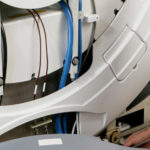A Convenient Truth: How Convenience Retailers Can Overcome Their Unique Logistics Challenges
John Cox
National Accounts
Technical Transportation, Inc
According to the National Association of Convenience Stores (NACS), the growth in convenience stores across the United States continues to rise into record numbers. With those new stores also comes a seemingly endless flow of new technology and new automated equipment. This makes logistics services for the industry more challenging than ever.
Delivering new in-store and back office equipment and technology to convenience retailers is a unique endeavor, because the daily demands of convenience stores themselves are unique compared to most businesses, including the broader retail industry. Following are some of the challenges faced when coordinating logistics services with convenience stores:
1. A Premium on Space
From the customer-facing storefront to the back office and storage area, space is hard to come by at most convenience store locations. You don’t want your logistics partner to contribute to that headache by piling product or equipment on your store floor in a way that impedes business.
2. A Premium on Personnel
Just like there’s a finite amount of square footage in each store, there’s also a limited number of personnel. Logistics providers often introduce non-revenue-generating activity for these employees by having them observe, supervise, and assist with a multi-step delivery process. This either takes them away from necessary day-to-day operational activities , or away from assisting customers on the storefront side.
3. Scheduling and Communications
As a rule, convenience and grocery retailers receive more daily deliveries than most retailers because of the premium on space and the nature of perishable goods. And that means more trucks, more drivers and more shipments coming to your location. So when you introduce multiple logistics providers, that’s more trucks to manage; more dock space or outside store space to secure for deliveries; and additional personnel pulled to supervise the drivers. It becomes even more complicated if you need to schedule an after-hours or overnight delivery of in-store equipment.
Convenience Retailers Need Turnkey Logistics Partners
To meet these challenges, both manufacturers of convenience store equipment and technology and convenience retailers themselves need logistics partners that provide adaptable turnkey services to fit their specific needs at each store.
An ideal provider needs deep knowledge of the convenience store industry and should intimately understand the demands that convenience retailers face each day. They also need to know the ins-and-outs of the equipment being delivered and have the right skill sets to manage and install the products, while efficiently troubleshooting any issues.
A turnkey provider should also be able to minimize the impact on a store’s personnel, time and space.
For example, traditionally, when there is new equipment to be installed or set up, one team would deliver and drop off the product and leave it at the store for an undetermined amount of time before a second team installs the equipment. This approach, however, can cause a lot of disruption for store employees and affect foot traffic.
A turnkey provider, however, will work with the convenience retailer to schedule a single, optimal time to deliver and install the equipment in a way that minimizes downtime and doesn’t get in the way of in-store business. In the end, convenience store logistics should be a convenient process for manufacturers and store personnel alike.
Need Help?
If you’d like more information on how your company can build and manage a nationwide field services program, then contact us today and we can help.



